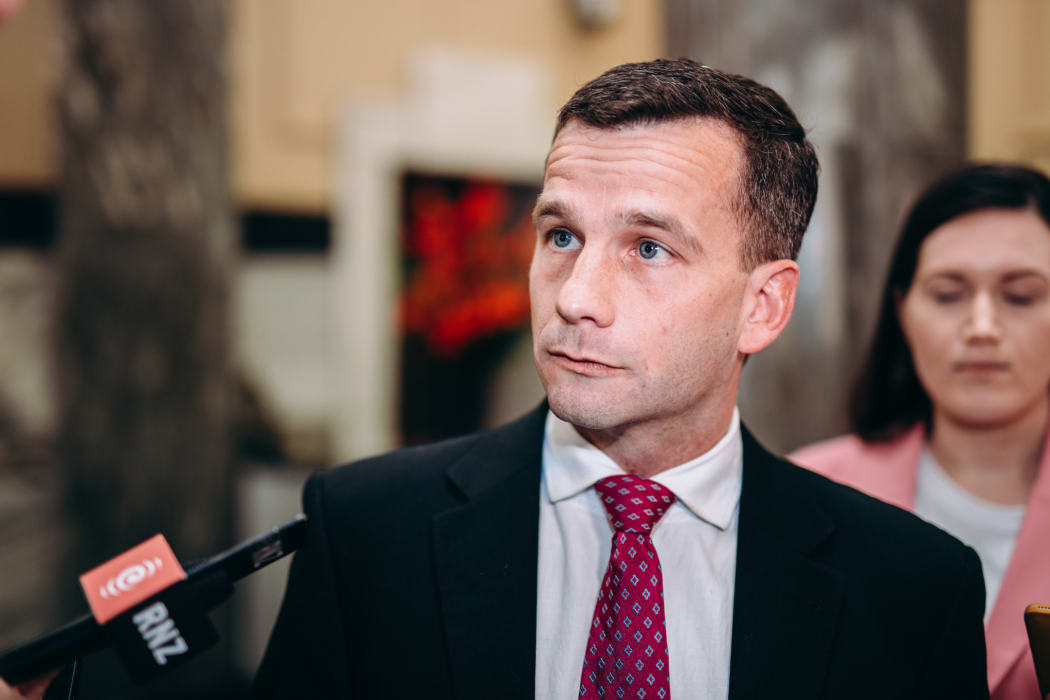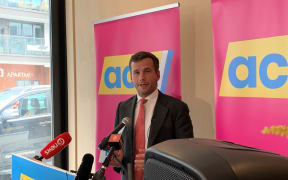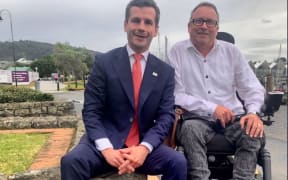The ACT Party is promising its biggest campaign in 15 years as it fights for more seats in Parliament after September's election.

ACT leader David Seymour used his speech at the campaign launch to hit out at the way the government has handled the Covid-19 pandemic. Photo: RNZ /Dom Thomas
ACT leader David Seymour has been the party's sole MP since 2014.
While he has won the Epsom electorate, ACT has struggled to get more than 1 percent of the party vote.
However, recent polls put support at about 3 percent - which means, if Seymour retains Epsom as expected, the party would end up with four MPs.
At the party's campaign launch in Auckland, ACT president Tim Jago said membership had more than doubled in the last year.
"You've seen the polls, certainly 3 percent, nudging 4 percent and we're hearing stories that the other parties have us at 5 percent," Jago said.
"We were being written off little more than a year ago as a one-MP party unable to climb above 1 percent.
"We are the only parliamentary party that's consistently over the past 12 months trended upwards."
Jago told the crowd of 600 party faithful that they were aiming to get as high as 6 or 7 percent of the party vote, which would give ACT eight MPs.
The party's "campaign war room" was up and running, and a nationwide bus tour was organised, Jago said.
While Jago was pitching this year's election campaign as the party's "most expansive" since 2005 - it would also be its most expensive.
"There will be no change out of a million dollars," Jago said.
ACT used its campaign launch to announce two new policies - one targeting the welfare system and the other to overhaul the way mental health and addiction services are funded and delivered.
A new employment insurance scheme
ACT's third-ranked candidate Nicole McKee unveiled the party's plan to bring in an employment insurance scheme for people who find themselves out of work.
There would be no changes to income tax, but 0.55 percent of the tax paid would be allocated to a ring-fenced employment insurance fund.
If someone lost their job, they would be able to claim 55 percent of their average weekly earnings over the previous year - up to $60,000.
Insurance could be claimed for one week of every five weeks the person has worked, up to a maximum of 26 weeks per claim.
That would mean someone who has worked continuously for one year could claim up to 10 weeks' employment insurance.
Once someone had used up their entitlement, they could then go on to the jobseeker benefit.
McKee said the insurance scheme would be fairer than the current system.
"People get paid out in proportion to what they pay in, rather than a flat benefit rate regardless of their outgoings or previous tax contributions," she said.
"It would remove the stigma associated with collecting a benefit for people out of work for a short time through no fault of their own. New Zealanders would be collecting an insurance payout from a fund they'd paid into for that very purpose."
But ACT wants to bring in tougher restrictions on beneficiaries' spending, through the use of "electronic income management".
That would apply to people on the jobseeker benefit and people on sole parent support who have subsequent children while receiving the benefit.
Their benefit would be issued on an electronic card with restrictions on alcohol, gambling and tobacco spending.
Revamping mental health funding
ACT's deputy leader Brooke van Velden announced the party's policy to overhaul the way mental health and addiction services are funded and delivered.
She wants the Mental Health and Wellbeing Commission - renamed as Mental Health and Addiction New Zealand (MHANZ) - to be the central provider of funding.
Instead of channelling money through the Ministry of Health and district health boards, van Velden said the beefed up agency would assess someone's needs and contract the best providers for their care.
That would mean funding for services would be determined by - and attached to - the care of individuals and their needs.
"MHANZ would be the one central interface for mental health and addiction funding, reducing bureaucracy and administrative burden," van Velden said.
"It would develop expertise in evaluating where the money is going and what services work based on evidence and data. It would issue clear and certain contracts to service providers while keeping a keen eye on outcomes and quality of care."
Seymour critical of the government's Covid-19 response
Seymour used his speech at the campaign launch to hit out at the way the government has handled the pandemic.
He said there is no strategy for dealing with the fallout from the pandemic and the government needed a clear strategy and to seize the opportunity to be a world leader in public health.
"We must openly pursue having the world's smartest border, not as a rhetorical device, but a practical reality.
"The goal should be smart borders that people and money can come through, but not Covid-19," Seymour said.
He said there needed to be an open debate about just how long New Zealand could keep its borders shut and what the options were for safely opening up - and the criteria that would need to be met.
Seymour said New Zealand should be opening up, as a first priority, to Covid-19-free Pacific neighbours.
There also needed to be a greater emphasis on using smart technology, and exploring options around wearable GPS devices that could cut isolation times, and pre-departure testing.
"If we can have smart public health and get back on a sustainable fiscal track, then I'm actually quite optimistic about New Zealand's future," Seymour said.
"Being an island in a Covid-19 world gives us choices that continental countries do not have. We can change our future by choosing how we engage with the world, but only if we're prepared to think creatively, and have an open debate."




